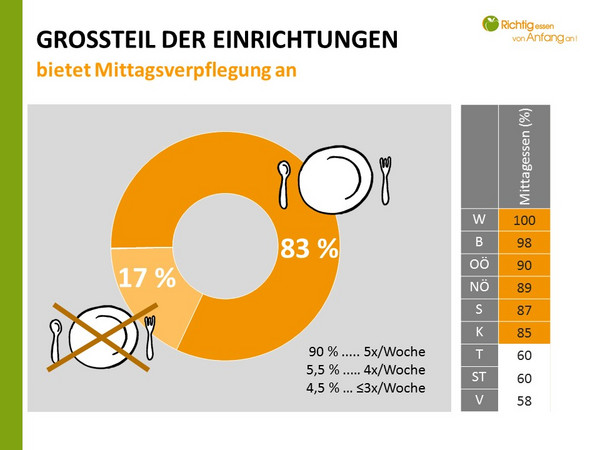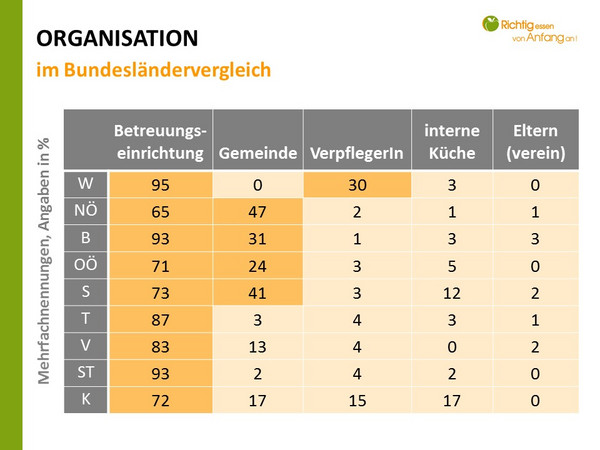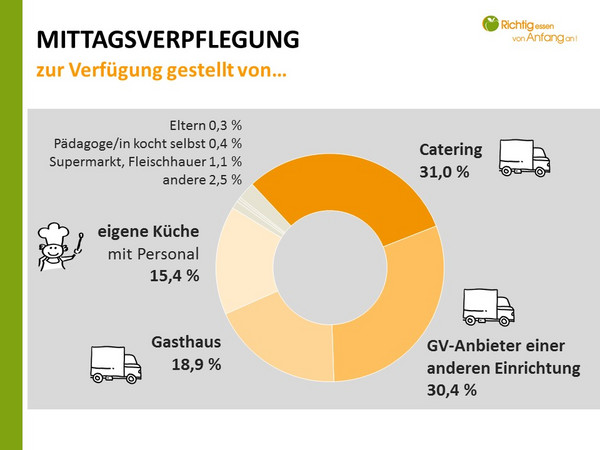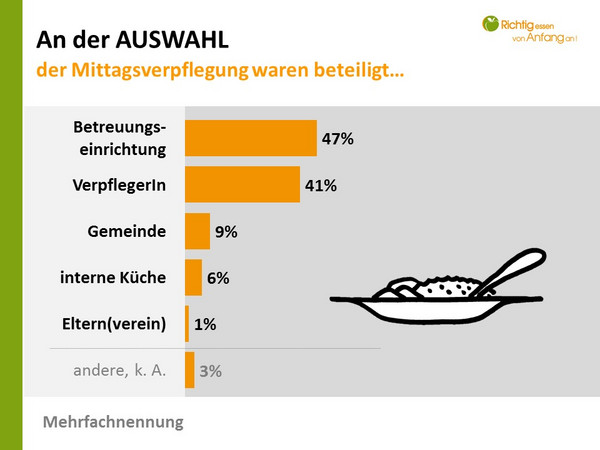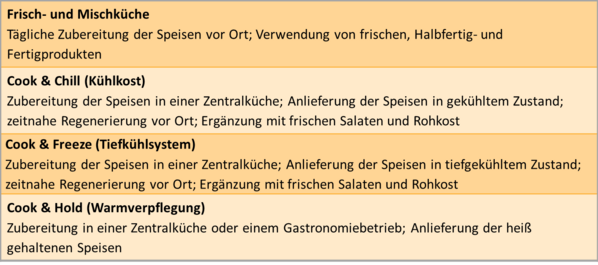Kindergarten catering
Alongside the home, the kindergarten is a central living space for children and can therefore also make an important contribution to a healthy diet. The Austria-wide survey on kindergarten catering shows that nutritional offerings vary greatly from kindergarten to kindergarten. In some kindergartens, breakfast, a morning snack and an afternoon snack are provided in addition to lunch. This means that kindergartens can cover a large proportion of children's daily energy and nutrient intake and therefore not only have an influence on nutritional behaviour, but also contribute to the healthy development of our children.
Children are particularly curious. These are good prerequisites for familiarising children with a varied and healthy diet. In addition to playfully thematising a healthy diet, the food and drink on offer in kindergarten should also be healthy and age-appropriate.
In addition to many regional health promotion measures in kindergartens, the nationwide recommendations for lunch in kindergartens to an optimised range of meals in the kindergarten.

Survey on the catering situation in Austrian kindergartens
The demand for all-day education and childcare facilities for children is constantly increasing. The topic of communal catering in kindergartens is therefore becoming increasingly important. Kindergartens and their providers are increasingly faced with the task of providing optimum catering for children in their facilities.
The basis for optimal planning and implementation of measures is a good data situation. For this reason, "Richtig essen von Anfang an!" carried out a nationwide telephone survey on the catering situation in Austrian kindergartens. With the exception of Vienna and Burgenland, data on Austrian kindergartens was provided by Statistics Austria. The aim of this survey was to precisely record the catering situation with a focus on lunch at Austrian kindergartens. This is the first time that nationwide data on the catering situation at nursery schools is available for the whole of Austria. The results of the survey are intended to provide decision-makers, implementers and operators with an informative basis for decisions or assistance with questions relating to kindergarten catering. Responsibilities, processes and regional differences are highlighted and nationwide comparisons are possible. In addition, state-specific data is available for regional project planning.
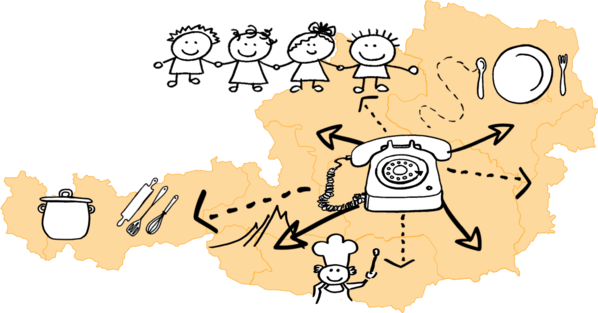
Methodology:
- Austria-wide telephone survey
- Period: May-July 2016
The interviewers were trained in advance to ensure a standardised approach to the survey. All Austrian kindergartens were interviewed by telephone using a questionnaire that had been drawn up. Questions were asked about lunch and other catering services (e.g. Who provides the lunch? In what form of preparation? How many children make use of the catering services?) This allows, for example, the operator structure, the type and form of catering in the kindergartens (e.g. catering company or restaurant; cook + hold or cook + freeze) and the organisational structure surrounding the catering to be shown. The data was entered into a separate data mask parallel to the telephone call. To increase acceptance of the survey, an information letter was sent in advance to the relevant authorities in the federal states.
Key data:
- The survey covered 5,161 kindergartens.
- Participation rate: 75 % (n=3,869) of kindergartens in Austria.
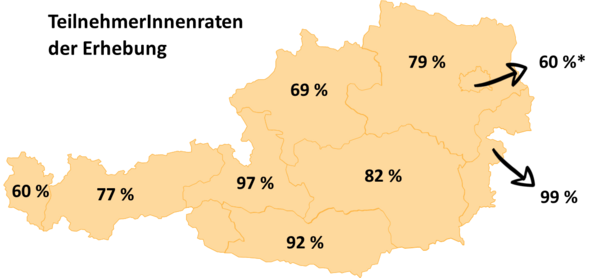
Participation rates in the survey
Figure: Participation rates in the survey; n= 3,869; *public kindergartens: 100 %, private kindergartens: 44 %
- Information was most frequently provided by the kindergarten management (55%), followed by the municipality/state (30%).
- Around ¼ of the kindergartens surveyed are run by private organisations, around ¾ are public.
Results to date
School catering
Taste preferences and eating habits are formed in early childhood, consolidated in adolescence and are difficult to change afterwards. It is therefore important to promote healthy eating in childhood and adolescence.
The school environment and the communal catering offered there has great potential in terms of promoting sustainable and healthy eating behaviour in children and young people. An attractive and healthy catering offer as a contribution to healthy eating for pupils and school staff is particularly important.
In addition to the actual food and drink on offer, there are numerous other factors that can contribute to successful catering at school. The "Communal Catering" working group of the National Nutrition Commission has drawn up recommendations for school lunches to help with this. Subsequently, the checklist for school catering with accompanying information was developed as part of the "Eat right from the start!" programme.

DIALOGue on catering for children and young people
On behalf of the Federal Ministry of Social Affairs, Health, Care and Consumer Protection and in cooperation with the Austrian Agency for Health and Food Safety, the umbrella organisation of Austrian social insurance companies and the Healthy Austria Fund, "Eating right from the start!" hosted a dialogue on catering for children and young people in Vienna on 10 March 2020.
Over 140 guests accepted the invitation to spend a day exploring the question of how to successfully implement healthy catering in childcare facilities and schools.
Download DIALOGue report on catering for children and young people
Models of good practice for health-promoting catering in the childcare facility and/or school setting
In five workshops, those responsible for measures together with committed implementers provided informative and inspiring insights into Austrian models of good practice.
As part of a nationwide call for proposals in autumn 2019, ongoing and completed projects/measures for health-promoting catering in childcare facilities and/or schools were invited to be presented to a wide audience at the dialogue event. The submissions were selected on the basis of predefined quality criteria.
Healthy lunch at kindergarten - Healthy kindergartens in Burgenland (GeKiBu)
Office of the Burgenland Provincial Government, Burgenland
Since 2012, Burgenland kindergartens have been supported on their way to becoming "healthy kindergartens"; communal catering has been part of the programme since 2016. In order to optimise catering, guidelines were drawn up to support landlords and landladies, caterers and company kitchens in the health-promoting design of the food on offer. These guidelines are presented by nutrition experts in workshops with kindergarten managers and catering providers and implementation is supported in individual discussions.
More information at: https://www.burgenland.at/themen/gesundheit/gesunde-kindergaerten/
Fresh organic food for children in the municipality of Seeham
Kinderhaus Seeham, Salzburg
With the desire to offer a freshly prepared and healthy meal every day, around 150 children - kindergarten children, toddlers and primary school pupils - in the municipality of Seeham have been provided with a morning snack made from purely organic ingredients since 2010. Some of the children also receive a freshly cooked lunch. The meals are prepared by two cooks in the Seeham children's centre; the food comes from a small organic shop in the village. Once or twice a week, the kindergarten children can also bake or cook together with the cooks. The children get to know a variety of foods and learn the value of high-quality food and fresh preparation. The programme, the costs of which are largely borne by the municipality, is very well received and appreciated by parents.
More information at: https://www.seeham.at/Kinderhaus/
"Vitalküche" - Communal catering in Lower Austria & H2NOE - Water school: Drinking water. At my school.
NÖGUS/Initiative "Tut gut!", Lower Austria
As part of the "Vital Kitchen" programme, schools (as well as kindergartens and after-school care centres) can take advantage of up to two years of free process support together with catering establishments in order to develop a balanced range of food and drinks for the respective target groups. In addition, accompanying services such as parents' evenings, customer surveys, workshops for children/young people or teachers can be organised free of charge. Further training is offered for caterers and multipliers. The aim is to analyse and gradually optimise the entire existing catering offer. The basis for this is the "Lower Austrian Community Catering Guideline".
More information at: https://www.noetutgut.at/bildung/vitalkueche/
The "H2NOE Water School" programme provides targeted support to ensure that only water is drunk in the morning at school. Teachers and pupils are equally involved in the programme. In addition to a training workshop for teachers, schools receive a wide range of motivational materials (drinking bottles, letters to parents, drinking passports, etc.).
More information at: https://www.noetutgut.at/bildung/h2noe-wasserschule-in-noe/
Focus on nutrition - from snacks to lunch!
AVOS Gesellschaft für Vorsorgemedizin GmbH, Salzburg
For almost 10 years, AVOS has been supporting schools in the province of Salzburg in optimising the catering situation in accordance with the minimum standards for communal catering facilities in Salzburg (of the Austrian Health Insurance Fund). The focus is on preventative activities in accordance with nutritional guidelines: optimising on-site catering during breaks, checking drinks vending machines, water fountains, urban gardening, etc. Solution packages are put together with school management, teachers, pupil representatives, parent representatives and providers and suitable measures are planned.
More information at: https://www.gesundessalzburg.at/avos/was-wir-tun/gesundheitsfoerderungen-fuer-bildungseinrichtungen/fokus-ernaehrung/
Mimi eats! Challenges in community catering for children
Styria vitalis, Steiermark
The "Mimi eats!" project worked in a new way with all those involved in the so-called catering triangle. Successful community catering projects involve not only the caterer, but also the facilities supplied and the maintainers. A successful catering concept is one that meets the possibilities and requirements of these partners and covers their needs well. Styria vitalis can already draw on many years of experience in the area of catering. Whereas a few years ago the focus was exclusively on the menu and changes to recipes, today communication processes, the regeneration and serving of meals in the facilities supplied, as well as the process and atmosphere of eating on site are central components of projects. A successful lunch is simply more than the number of calories on the plate.
More information at: https://styriavitalis.at/information-service/projektarchiv/

